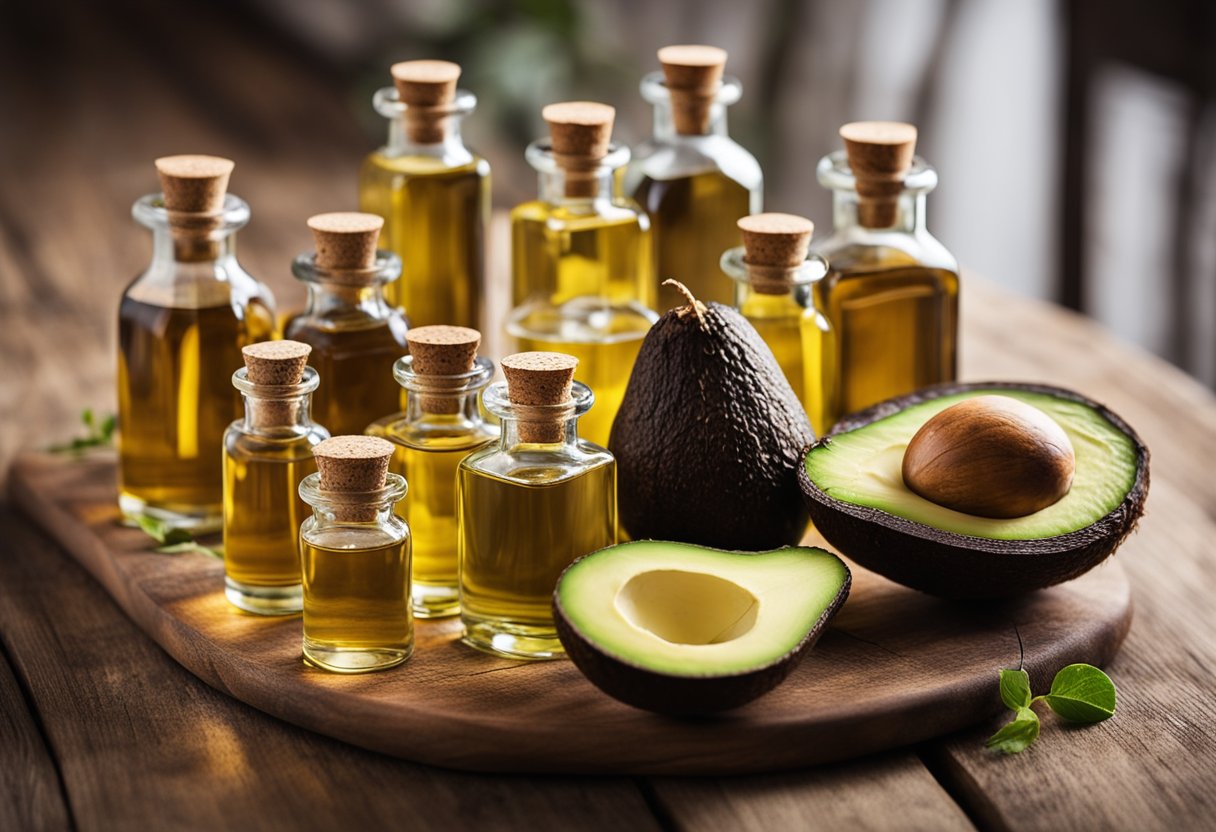I have compiled a list of 14 sunflower oil substitutes that you can try in your cooking. Sunflower oil is a popular cooking oil known for its mild flavor and high smoke point.
However, it may not always be available or suitable for everyone’s dietary needs. That’s where these substitutes come in handy.

Some of the best substitutes for sunflower oil include other oils like safflower, vegetable, peanut oil, walnut, canola, grapeseed oil, corn oil, flaxseed, avocado, coconut, soybean, cottonseed oil, and butter.
Each of these oils has its unique flavor and properties that make them suitable for different cooking methods and dishes.
In the next section, we will take a detailed look at each of these substitutes and their culinary uses.
Key Takeaways
- There are several sunflower oil substitutes that you can use in your cooking.
- Each of these substitutes has its unique flavor and properties that make them suitable for different cooking methods and dishes.
- Understanding the culinary uses of each substitute can help you choose the right one for your recipe.
Understanding Sunflower Oil

Sunflower oil is a popular cooking oil that is extracted from sunflower seeds. It is commonly used in various recipes, including frying, baking, and salad dressings.
Sunflower oil is considered healthy due to its high content of monounsaturated and polyunsaturated fats, which are known to be beneficial for heart health.
Sunflower oil is a type of vegetable oil that is commonly refined to remove impurities and increase its shelf life.
Refined sunflower oil has a high smoke point, which makes it ideal for high-heat cooking methods like frying and roasting.
However, the refining process can also remove some of the nutrients from the oil, including vitamin E.
There are different types of sunflower oil available in the market.
High oleic sunflower oil is a type of sunflower oil that has a high content of monounsaturated fats and a low content of polyunsaturated fats. It is considered to be one of the healthiest types of sunflower oil available.
On the other hand, linoleic acid is a type of polyunsaturated fat that is found in some types of sunflower oil.
It is known to be beneficial for heart health, but it also has a low smoke point, which makes it unsuitable for high-heat cooking methods.
Another type of sunflower oil is high-stearic with high-oleic acid sunflower oil, which is a hybrid of high-oleic and high-stearic sunflower oils.
It has a high smoke point, making it ideal for frying and other high-heat cooking methods.
Cold-pressed sunflower oil is another type of sunflower oil that is extracted without the use of heat or chemicals.
It retains more of the nutrients and flavor of the sunflower seeds, making it a healthier and more flavorful option than refined sunflower oil.
In conclusion, sunflower oil is a versatile and healthy cooking oil that is widely used in various recipes. It is available in different types, including high oleic, linoleic, high-stearic with high-oleic acid, refined, and unrefined sunflower oil.
When choosing sunflower oil, it is important to consider its smoke point, nutrient content, and processing method to ensure that you are using the best type of oil for your cooking needs.
Health Implications of Sunflower Oil
As with any food product, it is important to consider the health implications of consuming sunflower oil. Here are some key points to keep in mind:
- Heart Health: Sunflower oil is often touted as a heart-healthy oil due to its high levels of unsaturated fats. However, it is important to note that not all unsaturated fats are created equal. While monounsaturated and polyunsaturated fats have been shown to have heart-healthy benefits, some research suggests that high levels of omega-6 fatty acids (found in sunflower oil) may actually increase the risk of heart disease when consumed in excess.
- Inflammation: Sunflower oil contains both omega-6 and omega-3 fatty acids, which are important for maintaining a healthy balance of inflammation in the body. However, many people consume too much omega-6 and not enough omega-3, which can lead to chronic inflammation.
- Anti-inflammatory Properties: Despite its potential to contribute to inflammation, sunflower oil also contains compounds with anti-inflammatory properties. For example, one study found that sunflower oil may help to reduce inflammation in people with asthma.
- Immune System: Sunflower oil contains vitamin E, which is an important nutrient for maintaining a healthy immune system.
- Low in Saturated Fats: One of the benefits of using sunflower oil as a cooking oil is that it is low in saturated fats, which have been linked to an increased risk of heart disease.
- Weight Loss: Some research suggests that consuming sunflower oil may help with weight loss. For example, one study found that people who consumed a diet high in monounsaturated fats (like those found in sunflower oil) lost more weight than those who consumed a diet high in saturated fats.
- Digestive System: Sunflower oil may also have benefits for the digestive system. For example, it has been shown to have a mild laxative effect and may help to relieve constipation.
Overall, while sunflower oil does have some potential health benefits, it is important to consume it in moderation and as part of a balanced diet.
As with any food product, it is always a good idea to consult with a healthcare professional before making any significant changes to your diet.
Culinary Uses of Sunflower Oil

As a neutral-tasting oil, sunflower oil is a versatile ingredient in the kitchen. It has a high smoke point, which makes it ideal for high-heat cooking methods such as stir-frying, sautéing, and deep-frying.
Sunflower oil is also a popular choice for baking because it is mild in flavor and does not overpower other ingredients. It works well in recipes for cakes, cookies, and bread.
In addition to its uses in cooking and baking, sunflower oil can be used in salad dressings and sauces. Its neutral flavor allows it to blend well with other ingredients, making it a good choice for homemade salad dressings.
Sunflower oil can also be used as a finishing oil for dishes such as soups, rice dishes, and smoothies. Its light flavor and texture bring a pleasant touch to these dishes.
When substituting sunflower oil in recipes, it is important to consider the smoke point and flavor profile of the substitute oil.
For example, olive oil has a lower smoke point than sunflower oil, so it may not be ideal for high-heat cooking methods. On the other hand, peanut oil has a strong flavor that may not work well in certain recipes.
Overall, sunflower oil is a versatile ingredient that can be used in a variety of culinary applications. Its neutral flavor and high smoke point make it a popular choice for cooking, baking, and salad dressings.
When substituting sunflower oil in recipes, it is important to consider the specific needs of the dish and choose a substitute oil accordingly.
Sunflower Oil in the Global Market
As of 2021, the global sunflower oil market size was valued at USD 18.50 billion and is projected to reach USD 29.59 billion by 2028, growing at a CAGR of 6.12% during the forecast period (2021-2028) Fortune Business Insights.
The rise in demand for sunflower oil can be attributed to its versatility, as it can be used in cooking, as a salad dressing, and as an ingredient in many processed foods.
Europe is the largest producer of sunflower oil, with Russia being the largest producer and exporter of the commodity Maximize Market Research.
The Ukraine-Russia crisis in 2014 caused a significant disruption in the sunflower oil market, as Ukraine was a major producer of sunflower oil and a significant exporter to Europe.
This led to a shortage of sunflower oil in Europe, which in turn led to an increase in prices.
North America is also a significant consumer of sunflower oil, with the United States being the largest importer of the commodity Maximize Market Research.
However, due to the limited production of sunflower oil in North America, the majority of the sunflower oil consumed in the region is imported from Europe and other parts of the world.
Sunflower oil has a relatively long shelf life, which makes it a popular choice for many food manufacturers. However, due to the shortage of sunflower oil in recent years, many brands have been forced to look for alternative oils to use in their products.
Rapeseed oil has become a popular alternative choice for producers, as it can be cooked at very high temperatures, just like sunflower oil.
However, supply is limited, which has caused prices to increase significantly in some cases Retail Insight Network.
In conclusion, sunflower oil is a versatile commodity that is widely used in the global food industry. Europe, and in particular Russia, is the largest producer of sunflower oil.
The Ukraine-Russia crisis in 2014 caused a significant disruption in the sunflower oil market, leading to a shortage of sunflower oil in Europe and an increase in prices.
North America is also a significant consumer of sunflower oil, but due to limited production, the majority of the sunflower oil consumed in the region is imported from Europe and other parts of the world.
Alternative oils, such as rapeseed oil, have become popular choices for producers due to the shortage of sunflower oil in recent years.
Understanding Substitutes for Sunflower Oil
As a health-conscious cook, I am always looking for ways to make my meals healthier without compromising on taste.
One of the ways I do this is by substituting sunflower oil with healthier alternatives that provide the same great taste and texture.
There are many substitutes for sunflower oil, and some of the best include safflower, vegetable, peanut oil, walnut, canola, grapeseed oil, corn oil, flaxseed, avocado, coconut, soybean, cottonseed oil, and butter.
Each of these oils has its unique flavor, texture, and health benefits, making them ideal for different types of dishes.
When looking for the best substitutes for sunflower oil, it is essential to consider the smoke point, flavor, and nutritional value of each oil.
For instance, if you are looking for a healthy alternative to sunflower oil, you might want to consider using avocado oil, which is rich in healthy monounsaturated fats and has a high smoke point, making it ideal for frying and baking.
Another great substitute for sunflower oil is coconut oil, which is rich in healthy saturated fats and has a sweet, nutty flavor that works well in baking.
Coconut oil is also a great source of lauric acid, which has been shown to have antimicrobial properties.
If you are looking for a sunflower oil substitute in carrot cake, you might want to consider using applesauce or mashed bananas, which can add moisture and sweetness to the cake without adding any fat.
You can also use yogurt or sour cream, which can add a tangy flavor and creamy texture to the cake.
In conclusion, there are many healthy alternatives to sunflower oil that you can use in your cooking and baking.
By experimenting with different oils and ingredients, you can find the perfect substitute that works for you and your family.
Detailed Look at Sunflower Oil Substitutes

As a cooking oil, sunflower oil is a popular choice due to its mild flavor and high smoke point.
However, if you are looking for a sunflower oil substitute, there are plenty of options available. Here are some of the best substitutes for sunflower oil:
- Canola oil: Canola oil is a great substitute for sunflower oil as it has a neutral flavor and a high smoke point. It is also lower in saturated fat than sunflower oil.
- Olive oil: Olive oil is a healthy and flavorful substitute for sunflower oil. Extra virgin olive oil has a fruity taste and is best used for dressings and dips, while virgin olive oil is ideal for sautéing and frying.
- Peanut oil: Peanut oil has a slightly nutty flavor and a high smoke point, making it a great substitute for sunflower oil in stir-fries and deep-frying.
- Coconut oil: Coconut oil has a sweet and nutty flavor and a high smoke point, making it a great substitute for sunflower oil in baking and frying.
- Safflower oil: Safflower oil is a neutral-tasting oil with a high smoke point, making it a great substitute for sunflower oil in high-heat cooking.
- Avocado oil: Avocado oil has a mild flavor and a high smoke point, making it a great substitute for sunflower oil in baking and frying.
- Corn oil: Corn oil has a neutral flavor and a high smoke point, making it a great substitute for sunflower oil in high-heat cooking.
- Butter: Butter can be used as a substitute for sunflower oil in baking and cooking. However, it has a lower smoke point and can burn easily.
- Walnut oil: Walnut oil has a nutty flavor and a low smoke point, making it a great substitute for sunflower oil in dressings and dips.
- Grapeseed oil: Grapeseed oil has a neutral flavor and a high smoke point, making it a great substitute for sunflower oil in high-heat cooking.
- Soybean oil: Soybean oil has a neutral flavor and a high smoke point, making it a great substitute for sunflower oil in high-heat cooking.
- Flaxseed oil: Flaxseed oil has a nutty flavor and a low smoke point, making it a great substitute for sunflower oil in dressings and dips.
- Sesame oil: Sesame oil has a nutty flavor and a low smoke point, making it a great substitute for sunflower oil in dressings and dips.
As you can see, there are plenty of sunflower oil substitutes available, each with its own unique flavor and properties.
When choosing a substitute, consider the flavor profile of the dish and the cooking method to ensure the best results.
Comparing Nutritional Profiles

When it comes to choosing a sunflower oil substitute, it’s important to pay attention to the nutritional profile of each option. Here’s a comparison of some of the most popular substitutes:
Saturated and Unsaturated Fats
Sunflower oil is known for its high levels of unsaturated fats, which are considered to be healthier than saturated fats.
Some of the best substitutes for sunflower oil, like safflower and canola oil, also have high levels of unsaturated fats. On the other hand, coconut oil and butter are high in saturated fats, which are less healthy.
Oleic Acid and Linoleic Acid
Sunflower oil is also high in oleic acid, which is a monounsaturated fatty acid that can help lower cholesterol levels.
Safflower oil is another good source of oleic acid. However, if you’re looking for an oil that’s high in linoleic acid, which is an essential fatty acid that our bodies can’t produce on their own, then choose an oil like grapeseed or corn oil.
Omega-3 and Omega-6 Fatty Acids
While sunflower oil is a good source of omega-6 fatty acids, it’s not a good source of omega-3s. If you’re looking for an oil that’s high in omega-3s, then consider using flaxseed oil instead.
It’s important to have a balance of both omega-3 and omega-6 fatty acids in your diet, so consider using a combination of oils to get the right balance.
High-Heat Cooking
When it comes to high-heat cooking, not all oils are created equal. Some oils, like coconut oil and butter, are solid at room temperature and can withstand high heat without breaking down.
Other oils, like olive oil and avocado oil, are better for low-heat cooking or for use in dressings and sauces.
Neutral Flavor
If you’re looking for an oil with a neutral flavor that won’t overpower your recipes, then consider using grapeseed oil or canola oil. These oils have a mild flavor that won’t interfere with the taste of your food.
Nutty Flavor
If you’re looking for an oil with a nutty flavor that can add depth to your dishes, then consider using walnut oil or almond oil. These oils have a distinctive flavor that can enhance the taste of your recipes.
Affordability
Some oils, like avocado oil and coconut oil, can be more expensive than other options. If you’re looking for an affordable substitute for sunflower oil, then consider using vegetable oil or soybean oil.
Nutrients
Different oils have different nutrient profiles. For example, avocado oil is high in vitamin E, while walnut oil is high in omega-3 fatty acids.
Consider the nutrient profile of each oil when choosing a substitute for sunflower oil.
Sunflower Oil and Its Role in Traditional Medicine

As a traditional medicine enthusiast, I have come across several references to sunflower oil in various practices.
Sunflower oil is known for its anti-inflammatory and antioxidant properties, which make it a popular ingredient in many traditional medicine remedies.
In Ayurveda, for example, sunflower oil is believed to have a cooling effect on the body and is used to alleviate conditions such as fever and inflammation. It is also used to promote healthy skin and hair.
Similarly, in traditional Chinese medicine, sunflower oil is used to treat skin conditions such as eczema and psoriasis. It is believed to nourish the skin and promote healing.
Aside from its use in traditional medicine, sunflower oil is also a popular ingredient in many cosmetics. Its emollient properties make it an excellent moisturizer, and it is often used in lotions, creams, and other skincare products.
Overall, sunflower oil has played a significant role in traditional medicine and cosmetics for centuries.
Its anti-inflammatory and antioxidant properties make it a valuable ingredient in many remedies, and its emollient properties make it an excellent moisturizer for the skin.
Frequently Asked Questions

What can I use as a substitute for sunflower oil in soap making?
If you are looking for a substitute for sunflower oil in soap making, there are many options available. Some of the best substitutes for sunflower oil in soap making are coconut oil, olive oil, palm oil, and avocado oil.
These oils have similar properties to sunflower oil and can be used in soap making recipes.
What is the best substitute for sunflower oil in baking?
If you are looking for a substitute for sunflower oil in baking, there are several options available. Some of the best substitutes for sunflower oil in baking are canola oil, vegetable oil, coconut oil, and grapeseed oil.
These oils have similar properties to sunflower oil and can be used in baking recipes.
Can I use olive oil instead of sunflower oil in baking?
Yes, you can use olive oil instead of sunflower oil in baking. However, it is important to note that olive oil has a strong flavor and may affect the taste of the final product.
If you are using olive oil as a substitute for sunflower oil in baking, it is best to use a mild-tasting olive oil.
What is the smoke point of sunflower oil?
The smoke point of sunflower oil is around 450°F (232°C). This means that sunflower oil can be used for high-heat cooking methods like frying and sautéing.
Is sunflower oil bad for you?
Sunflower oil is not inherently bad for you, but like all oils, it should be consumed in moderation.
Sunflower oil is high in polyunsaturated fats, which are considered healthy fats, but it is also high in omega-6 fatty acids, which can be harmful if consumed in excess.
What oil is most similar to sunflower oil?
If you are looking for an oil that is most similar to sunflower oil, safflower oil is a good option. Safflower oil has a similar flavor and nutritional profile to sunflower oil and can be used as a substitute in most recipes.
Other oils that are similar to sunflower oil include canola oil, grapeseed oil, and soybean oil.







